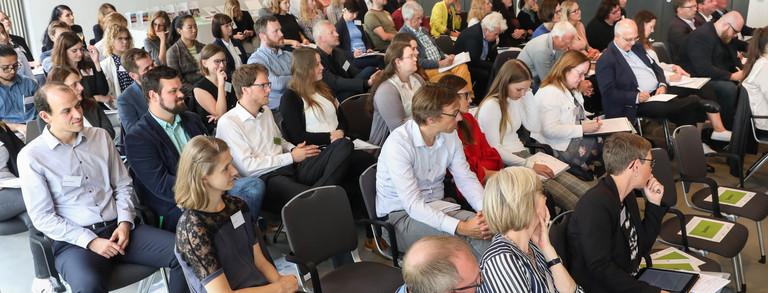IFS-Virtual Keynote Series
Start: January 19, 2026 and January 26, 2026, both at 3:00 pm (CET)
End: January 19, 2026 and January 26, 2026, both at 6:00 pm (CET)
Location: Online
Registration
The Center for Research on Education and School Development (IFS) at TU Dortmund University organizes the IFS-Virtual Keynote Series (VKS), an event that is internationally oriented and dedicated to significant topics in empirical educational research.
The next VKS will take place at 19th and 26th January 2026 under the theme "Well-being in the Educational Context: Understanding and Enhancing Student and Teacher Well-being".

The event will take place online via Zoom.
Renowned international researchers will present their research findings in these areas and will be available for subsequent discussion. The aim is to discuss the significance of artificial intelligence for learning and teaching as well as for educational research. In addition, different theoretical approaches as well as methodological approaches will be presented and different research findings on the main topics will be compiled.
We are looking forward to the upcoming IFS Virtual Keynote Series!
Program: „Well-being in the Educational Context: Understanding and Enhancing Student and Teacher Well-being“
| Date | Title | Speaker | |||
|---|---|---|---|---|---|
19th January | Well-being in the Educational Context: Understanding and Enhancing Student Well-being | ||||
| 3:00 – 4:15 pm (CET) | Insights into student well-being: From demands and resources to balance | Katja Upadyaya – University of Helsinki, Finland | |||
| 4:30 – 6:00 pm (CET) | School-based preventative intervention to foster students’ subjective well-being | Shannon Suldo – University of South Florida, USA | |||
26th January | Well-being in the Educational Context: Understanding and Enhancing Teacher Well-being | ||||
| 3:00 – 4:15 pm (CET) | Teachers’ and school principals’ well-being: What determines it, why it matters, and how to preserve it? | Irena Buric – University of Zadar, Croatia | |||
| 4:30 – 6:00 pm (CET) | Leading with resilience: A journey of school well-being cascade | JunJun Chen – Education University of Hong Kong, Hong Kong | |||
Abstracts
Insights into student well-being: From demands and resources to balance
Student well-being is often described in terms of two related constructs: engagement and burnout in studies. Engagement is characterized by three key dimensions: energy, dedication, and absorption. These dimensions collectively capture students’ psychological investment in their learning processes. In contrast, student burnout manifests as emotional exhaustion, cynicism or detachment from studies, and feelings of inadequacy or reduced efficacy. It arises from prolonged academic stress that overwhelms students’ resources, leading to diminished motivation, well-being, and academic performance. Burnout is considered the erosion or negative counterpart of engagement and poses significant risks to students’ mental health and educational success. The Study Demands-Resources (SD-R) model provides a comprehensive framework for understanding how study demands (workload, stress) interact with available resources (social support, self-esteem) to influence engagement, burnout, and overall well-being.
It distinguishes a motivational process, where personal and contextual resources enhance engagement, leading to positive outcomes, from an energy-depleting process, where excessive demands cause burnout and decreased well-being. Resources, such as teacher and parent support, socio-emotional skills, and self-esteem are vital for helping students manage challenges and maintain engagement throughout different educational stages. In addition, the integradted perspective of the study demands-resources model provides possibilities for future interventions.
School-based preventative intervention to foster students’ subjective well-being
This presentation will address how to integrate positive psychology assessment and interventions into school mental health services. In particular, this session will describe how to promote students’ subjective well-being through a preventative intervention—the Well-Being Promotion Program (WBPP; Suldo, 2016)—for students who report low life satisfaction during universal screening of mental health. The Well-Being Promotion Program is a manualized, multitarget school-based positive psychology intervention with empirical support for increasing middle school students’ life satisfaction and positive affect (Roth et al., 2017; Suldo et al., 2014). The 10 core WBPP sessions cultivate positive emotions about the past, present, and future; increase engagement through signature strengths use; and build relationships. The presenter will illustrate implementation and evaluation of the WBPP as a preventative intervention through a case study whereby school counselors in six U.S. middle schools (in Florida and Massachusetts) provide the WBPP to students with low SWB. Students served in small groups (6 – 12 students per group) meet weekly for ten weeks in the fall term (core WBPP), then monthly in the spring term for follow-up sessions to rehearse positive activities from core sessions. Session participants will learn (1) how to identify students for targeted intervention (secondary preventative intervention) through universal screening of subjective well-being, (2) how to implement the Well-Being Promotion Program (WBPP), which fosters gratitude, hope, optimism, character strengths use, and relationships, and (3) how to evaluate outcomes in a clinically and educationally meaningful manner from multiple informants and using multiple methods (Suldo, Fefer, & Shum, 2024).
Teachers’ and school principals’ well-being: What determines it, why it matters, and how to preserve it?
School principals’ and teachers’ well-being is a cornerstone of high-quality education, yet it is increasingly challenged by the demands of modern schooling. This lecture examines what occupational well-being means for school principals and teachers, why it matters, and how it can be sustained. Drawing on the Job Demands–Resources (JD-R) theory, it explores how job demands (e.g., work pressure, daily hassles, qualitative demands, illegitimate tasks) may undermine well-being, while personal and organizational resources—such as self-efficacy, resilience, autonomy, social support, feedback, and positive relationships with students and parents—can act as protective factors. Occupational well-being includes both positive dimensions (e.g., engagement, happiness, job satisfaction) and negative dimensions (e.g., burnout, work addiction, impaired health), and the balance between them determines whether educators thrive or struggle in their roles. The lecture also highlights the consequences of compromised well-being, including reduced motivation, strained relationships, diminished performance, and attrition. Lastly, strategies for safeguarding school principals’ and teachers’ well-being will be considered at multiple levels, including individual (e.g., stress management, recovery), school (supportive leadership, collaboration), policy (reducing demands, enhancing resources), community (respecting and protecting the profession), and research (evidence-based interventions). By integrating theory, research findings, and practical implications, the lecture will emphasize that supporting school principals’ and teachers’ well-being is essential for sustaining a motivated workforce, improving student outcomes, and ensuring the long-term success of education systems.
Leading with resilience: A journey of school well-being cascade
The work of school principals has always been complex and challenging. This phenomenon has inevitably threatened principal well-being and school effectiveness. Principal resilience has therefore become a pressing line of research as principals often struggle to cope not only with professional challenges and uncertainties around building a successful school but also with their own and their school well-being. Moreover, the notion of ‘principal first’ has recently been placed on the agenda to cultivate principal resilience, thereby establishing a school well-being cascade. Based on the current literature on educator well-being and resilience, and meta intervention evidence in the field, this presentation will talk about essentials of resilience, science of resilience, and build school collective well-being cascade.





